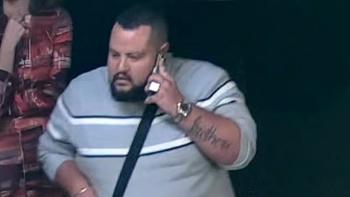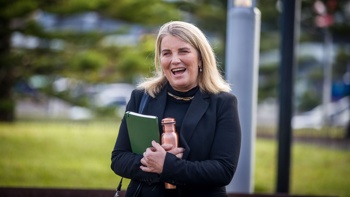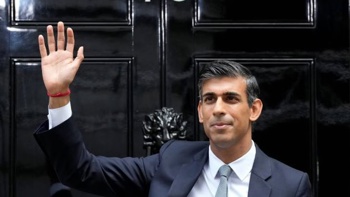WARNING: This story contains graphic and sensitive content
Lauren Dickason’s journey to become a mother and long battle with depression and anxiety has been canvassed at her trial for the murder of her three young daughters.
Her husband has outlined how the now-42-year-old underwent a total of 17 gruelling rounds of IVF and eventually used donor eggs to have their children.
He said the DNA of the girls made “no difference” to the couple and his wife was “a loving mother”.
Dickason has admitted killing 6-year-old Liané and 2-year-old twins Maya and Karla at their Timaru home on September 16, 2021.
She killed the children just 20 minutes after her husband Graham Dickason left their home to attend a work function.
She tried to asphyxiate them using cable ties and when that did not work, smothered them with blankets then tucked them into bed with their favourite soft toys and tried to take her own life.
/cloudfront-ap-southeast-2.images.arcpublishing.com/nzme/DUXZ3GKXU4TKPB5TZ5OORWH75E.jpg)
Lauren Anne Dickason allegedly killed 6-year-old Liané, and 2-year-old twins Maya and Karla at their Timaru home on September 16. Photo / Facebook
The Crown alleges Dickason murdered the girls in a calculated and clinical way because she was angry and frustrated with them and resented the impact they had on her marriage.
While she admits she killed the three children, she has pleaded not guilty by reason of insanity and infanticide.
She is on trial before Justice Cameron Mander and a jury of eight women and four men in the High Court at Christchurch.
Her parents and brother have travelled to New Zealand from South Africa to support her in court.
Her husband’s sisters are also attending the trial.
Yesterday Graham Dickason - who has remained in South Africa but appears via audio-visual link - spoke for the first time about the death of his “gorgeous” daughters.
The jury watched an almost-three hour video of his interview with police where he described coming home and finding the three children lifeless in their beds, and his frantic attempts to revive them.
He then spoke at length about his family and life with the accused - her mental health, her parenting, their fertility struggles and harrowing journey to have a family and their decision to emigrate to New Zealand for a better and safer life.
In court today the defence began its cross-examination of the grieving father.
Lawyer Anne Toohey started the cross-examination by acknowledging Graham Dickason’s loss and how difficult giving evidence at his wife’s trial must be for him.
“I want to make this clear before I ask the questions of you today it is not the defence case today that you are to blame for anything that happened… or you should have done anything differently,” she said.
Graham Dickason agreed that his wife, whom he married in May 2006, was a “loving wife and a loving mother”.
He said early in the marriage Dickason’s “primary focus” was to have children.
But when they started trying they had no luck and turned to fertility specialists for help.
During that time Dickason - also a doctor - began to prescribe herself antidepressants.
In South Africa, it is legal and common for doctors to self-prescribe medication and she made no secret of what she was taking within her marriage.
From joy to heartache as Dickasons lose first daughter
Dickason went through seven rounds of IVF before she fell pregnant with a daughter who was to be named Sarah.
In January 2013, when she was just 18 weeks pregnant, Dickason suffered serious health complications and had to give birth to the baby.
The baby had a heartbeat but died soon after.
The couple got to see and hold the little girl briefly before she was taken away.
The death was categorised as a miscarriage and Dickason was not able to take her child home which affected her significantly.
The court heard Dickason cried “every single day for two months”.
The couple went through two more rounds of unsuccessful IVF and then decided to use a donor egg.
Dickason then became pregnant with Liané.
Her husband told the court that his wife “never expressed any feeling that the girls were anything other than hers” and in his eyes she was the mother.
“It made no difference to us,” he said.
During the pregnancy with Liané, Dickason was “a nervous wreck”.
After Liané was born Graham Dickason said his wife was tired and they both took time to adjust to their new family.
/cloudfront-ap-southeast-2.images.arcpublishing.com/nzme/OUYWKKFN4FE2YSCTODWCTANYFY.jpg)
Lauren Dickason with twins Maya and Karla. Photo / Supplied
During that time Dickson sought psychiatric help and was diagnosed with “major depressive disorder and postpartum depression” as well as “underlying anxiety”.
Dickason was known to suffer from depression and anxiety for many years before that.
Her doctor changed her medication because her previous subscription was no longer enabling her to balance her mood.
Graham Dickason said that by the time Liané was about 18 months old, his wife was feeling and doing much better.
When Dickason was pregnant with the twins a scan showed Karla had a cleft palate.
The diagnoses caused a lot of stress for the mother-to-be who, along with worrying about the child’s general health, was concerned about possible feeding issues.
As a result, the couple hired a night nanny to help them.
A day nanny was also eventually hired to help ease the demands of three young children on Dickason - who was parenting for much of the time on her own due to the demands of Graham Dickason’s job.
After the twins were born Karla’s condition was much less serious than expected and the couple were relieved.
She still had to undergo surgery and have both arms in splints to stop her touching her face afterwards.
She then developed ticks and Dickason was worried the baby had cerebral palsy.
A specialist ruled that out and eventually the tics stopped.
Dickason’s ‘meticulous’ care of children outlined
Graham Dickason agreed with Toohey that his wife was a “very organised woman” and she became stronger on that front as a mother.
She took “meticulous care” of the girls’ needs and was “very attentive” to everything each child was doing.
Dickason “worried about their wellbeing all of the time”.
/cloudfront-ap-southeast-2.images.arcpublishing.com/nzme/ZIWKIXZ6DVDTNBMJTVAAVJUK6E.jpg)
Police at the scene of the alleged murders as the children were being removed from the house. Photo / George Heard
The jury were shown a message Graham Dickason sent his wife at one stage in which he said:
“You are a wonderful mother, you have beautiful children, you give up so much for the kids. I see it,” he wrote.
Toohey then quizzed Graham Dickason about his comments to police during his interview after the alleged murders.
The interview was conducted over about three hours around 2am the day after the girls died.
Graham Dickason told police then that his wife was “not a nurturing mother”.
Toohey asked him to clarify what he meant by that.
“It was a very confusing moment in my life and… I was probably referring to the most recent times before our emigration but not Lauren as a whole,” he said.
He said his wife never hurt or abused the kids, was always “very concerned for their safety” and he did not doubt she loved them.
“There is no question in my mind at all (about that),” he said.
Toohey then showed the jury photographs of the girls and their mother.
The photographs, she said, illustrated that Dickason had genuine affection for her children - and they for her.
She said DIckason was “always trying to find fun things” to do with her family and did a lot of arts and crafts with the children.
When they emigrated to New Zealand a whole suitcase was filled with arts and crafts supplies to keep the twins and their older sister busy in managed isolation.
Dickason often baked with her daughters and made playdough.
/cloudfront-ap-southeast-2.images.arcpublishing.com/nzme/PUQO5WIGMNDP3CNK6QOCPXHBH4.jpg)
Tributes and flowers left outside the Dickason's Timaru home where the three girls died. Photo / George Heard
Sometimes the children preferred their father - which he said was natural as they grew and changed and often when he got home from work after they’d been home all day with their mother they would be overly excited to see him.
Graham Dickason told police in his interview the girls “preferred” him and that upset his wife.
He explained under cross-examination that he was referring to the immediate lead up to the alleged murders when he said that.
Toohey read the jury a message Graham Dickason sent his wife one Mother’s Day - which he agreed summed up how he and the children felt about his wife.
“You are a very special mommy. Best of the best. in a class of your own. We love you to infinity and beyond,” he said.
Messages about killing children ‘satrical’ not serious
Toohey spoke about messages Dickason sent and received about her family.
Crown Prosecutor Andrew McRae, in his opening, said there were a tranche of messages in which Dickason spoke about killing, murdering or hurting her children.
To one friend who asked her what she was watching on Netflix, she replied that she was watching Bloodline and it was “very good… otherwise, I’m just trying not to murder the twins”.
When speaking about spending two weeks in managed isolation when they arrived in New Zealand Dickason messaged a friend:
“God knows we probably might commit murder in that small room and those two weeks.”
The defence today quizzed Graham Dickason on the language used nature of her messaging.
He said his wife swore and had a “satirical” sense of humour so many of the things she wrote were in that context.
One message he sent her conveyed their banter which was never serious.
He wrote to Dickason:
“It seems so fun to spend time with your daughter. Now I’m glad I stopped you from killing her last night.”
Graham Dickason said both he and his wife would “vent” occasionally about their parenting frustrations.
Based on those messages he was never concerned about his children’s safety.
He said he was unaware of her messaging to friends about her struggles as a mum - but he was not surprised she was communicating with them.
Graham Dickason also told the court that when his wife came to him in 2019 saying she had thoughts of hurting their children - he put it down to her depression and anxiety.
She was “upset and horrified” at having the thoughts and Graham Dickason had no concern she would act on them.
He said he was more worried about his wife’s state and getting her help than Liane, Maya and Karla.
“I didn’t think (the children) were at risk - the reason for that is Lauren came to me with feelings of anxiety,” he said.
Not long after that Graham Dickason went away on a hunting trip.
“There was no sign to you that they were at any risk? Otherwise, there’s no way that you would have left the children alone with Lauren and gone away on a trip?” said Toohey.
“That’s correct… I agree,” Graham Dickason replied.
Toohey asked him if, looking back now, his take on his wife’s depression was “subjective” - and whether it was much more serious than he ever knew.
He said it was hard for him as a husband to diagnose Dickason - who was also a busy and tired mum - but it was possible she was suffering more than he realised.
“We were first-time parents, we had a baby that struggled to go to sleep and woke up at night - there was definitely tiredness… frustrations… emotions and Lauren would be crying sometimes.
“As a husband… I don’t think I could make a diagnosis of depression but I can’t deny that it could have been part of postpartum depression.”
Graham Dickason was then questioned about the couple’s emigration journey.
He told the court that as part of the New Zealand’s immigration requirements, Dickason’s doctor had to provide a letter about her mental health.
The couple initially wanted to come to New Zealand in 2020 for a job opportunity for Graham Dickason in Rotorua.
However, the Covid pandemic stymied that job.
During lockdowns in South Africa the family had their night nanny with them full time but she eventually left to go and be with her own family.
Graham Dickason said at the time he and his wife were very concerned about their situation but he did not think her depression had been exacerbated.
“Of course there was more than enough reason to have issues with your mental health,” he said.
“I was home with Lauren… we were doing the best we could.
“I don’t remember it was out of control.”
Toohey revealed Dickason had messaged a friend during the lockdown period.
“I’m struggling with lockdown at the moment. It’s affecting my depression and makes me a terrible mum and wife,” she wrote.
“I almost called you because I was suicidal, please don’t tell Graham.”
Graham Dickason was unaware of the messages until after the alleged murders.
‘Weight of the world’ on accused before move to New Zealand
This afternoon the jury heard more about Dickason’s mental state in the lead up to the move.
Her husband said there were times she was “down” but also “some positive moments in between”.
He thought her low mood and unhappiness were due to the stress of their life at the time - the process of moving countries, the pandemic, the unrest and fear in South Africa and the demands of three little children.
In March 2021 Dickason told her husband she wanted to trial stopping her antidepressant medication.
She was participating in a wellness programme and felt “quite well”.
She reached out to a psychologist soon after her conversation with her husband but did not tell him.
He messaged her around the same time, referring to her struggles:
“I am very aware that you feel this way. I am just very unsure how to help you - actually I am realising I can’t help you, you have to manage by yourself.
“I really try not to add to your stress… I am angry - not angry at you but I am angry because you feel like this.”
He was upset that his wife felt the “weight of the world” on her and she was “consumed by fatigue and frustrations”.
“Guilt, anger and frustrations are stealing your joy,” Graham Dickason wrote.
“I am angry because my efforts to try and help and ease your load is actually making it worse. Therefore I feel a bit lost as to what my role is at this stage of my life.
“I want you to be a mother and enjoy it.”
The court heard Dickason messaged a friend and said she cried before her husband went to work and again before she went to bed.
“I think he thinks I am crazy,” she wrote.
The cross-examination continues.
The trial is set down for three weeks.
Take your Radio, Podcasts and Music with you









